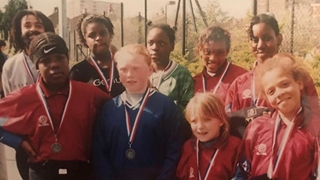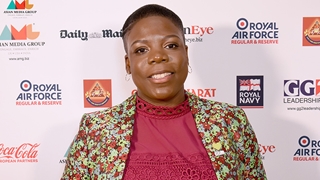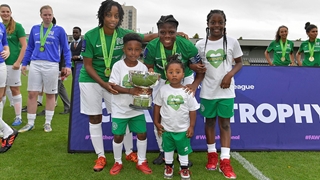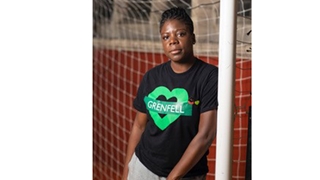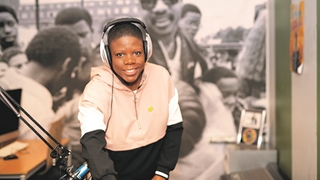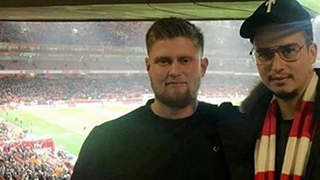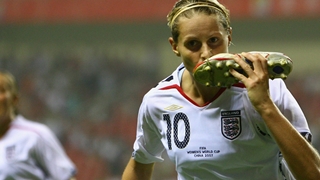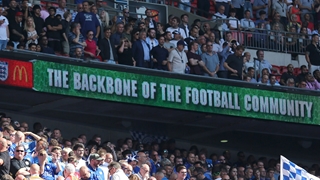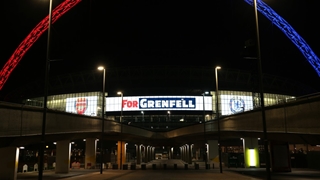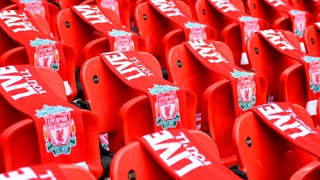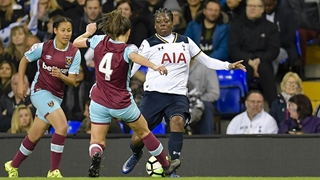
Eartha Pond might not have lived in Grenfell Tower, but it’s nonetheless proven a backdrop to her career both in and outside of sport.
The hard-hitting defender started her football journey at the Harrow Club aged 11 where she was soon scouted by Arsenal. She would go on to play for Chelsea, Everton, Reading, Queens Park Rangers, Leeds United, Barnet, New York-based side Buffalo Flash and Charlton Athletic before finally settling at Tottenham Hotspur and helping them win promotion to The FA Women’s Super League in 2016-17.
“It all started for me right outside the Grenfell Tower,” says Pond, who is also an elected councillor for Queens Park – the constituency she grew up in. “I was just playing with my friends and suddenly Arsenal expressed an interest via a local scout.
“One of my team-mates at the time was a girl called Dannielle Elcock, who is the sister of Grenfell United chair Natasha Elcock. Natasha lived on the eleventh floor and saved her family from the fire by intentionally flooding her bathroom to keep the flames at bay.”
The day of the fire was a little atypical for Pond. Just two weeks earlier she had won The FA Women’s Championship title with Spurs following a 3-0 victory over Blackburn Rovers, but as assistant headteacher at the Crest Academy she had no time to celebrate, especially not during exam season.
But on that Wednesday morning she woke up feeling ill so called in sick for the first time in her life.
“Perhaps it was fate that I didn’t go into school,” admits Pond. “It probably allowed me to help even more. Believe it or not, I had never missed a day of work before. Then as soon as I switched on the TV and heard about the fire I went into autopilot and knew I needed to help.
“Originally, Grenfell Tower wasn’t named as the building and knowing the fire was local, my first concern was for my gran who lives nearby. Once it was clear what had happened, I guess I just went into ‘councillor’ or activist mode.
“One of the first things I did was set up a GoFundMe page. I put a target of £5000 on it but as the severity of the fire became apparent, the community rallied and we managed to raise £85,000 through online donations to help the victims. I also went to the nearby Jubilee Sports Centre and persuaded them to be on standby to shut and become a refuge for those affected by the fire if required.
“In the hours, days and weeks after the fire it was all pretty disorganised. This was before the support group Grenfell United was formed. So the primary goal was to try and reassure the community that even in the absence of the appropriate elected authorities, the situation was being managed via community members.”
The Grenfell Tower fire sadly claimed 72 lives and for the past three years Pond has helped support and fundraise for those affected by the tragedy.
“One of the main things I've tried to do is just get people away from the area through enrichment opportunities,” says Pond. “It's a simple coping mechanism. Creating happy memories, in a safe space somewhere that’s a little distant, can be quite helpful.
“For example, I worked with Grenfell United to organise a trip to see Hamilton. The idea came after being part of a fundraiser alongside Giles Terera, who played Aaron Burr in the musical. He got some other actors involved as well, including Dame Judi Dench.
“Then on the football side, we all saw the huge success of the charity football match ‘Game4Grenfell’ at Loftus Road in 2017. I felt it was important to have a game which included women as well. So alongside the FA Women’s National League, we hosted their annual charity match at Meadow Park in Borehamwood.
"Kelly Smith, Rachel Yankey and Marianne Spacey all played and I think, a year on from the fire, it just gave the survivors, families of the victims and the local community at large a chance to enjoy the moment for the day. Football has the power to do that.”
The third anniversary of the Grenfell Tower fire is going to be a little different due to the COVID-19 pandemic. A virtual multi-faith vigil will be held on YouTube on Sunday evening and after sunset, Grenfell United are encouraging everyone to stream a green light from their television sets to honour the 72 victims as part of the ‘Go Green for Grenfell’ campaign.
“I think it’s going to be one of the hardest days since the fire due to social distancing rules,” says Pond. “All of us, not just those affected by the Grenfell Tower fire, must look after our mental health right now. That’s why the ‘Heads Up’ campaign is so important.
“Using Premier League and Women’s Super League players to reiterate there is no shame in getting help or talking is powerful. And renaming the Emirates FA Cup Final to the the Heads Up FA Cup Final further underlines the importance of mental well-being.
“Having reached a few Women’s FA Cup Finals in my career, and one won in 2005 with Charlton, I know the kind of global audience the tournament gets. With no fans allowed inside Wembley Stadium this season, the TV ratings for the men’s final may well be bigger than ever so it’s great to see Heads Up so prominently promoted.
“But I think we also need to hear from more grassroots voices. High-profile footballers will certainly encourage some people to seek help, but those in the grassroots game are accessible and relatable. They can be true mentors.
“It is also crucial that Heads Up doesn’t just end with this football season. Mental health problems can come and go, and in some cases last a lifetime. That’s why I spend a lot of my time now focusing on the long-term effect of both mental health and behavioural problems on young people. The latter can appear first and ultimately lead to the former later in life.
“With this in mind, I founded a charity, called the ESP Foundation, which creates opportunities for underprivileged young people in education, sport and politics – three areas I have experience in. I also founded PROM 8 a teaching programme that aims to work across several different schools in each academic year, supports under-performing pupils and encourages leadership through accelerated learning.”
Pond might be extremely active supporting the victims of the Grenfell Tower fire and helping the wider Queen's Park community, but she still hasn’t ruled out a return to football.
“People just assume I have retired, but I never officially did so,” she says. “I am 36 now and may still have one final season in me. I would just need to find the right fit, standard of football and location.
“But if I don’t play again, I still want to have a voice in football, especially on the very topical issue of black representation.
"First and foremost we need to stop using the catch-all word BAME. I don’t even know why it exists and it can sometimes stop a focus on individual minority groups who each have different needs.
“There are plenty of young black players in football, but they need clear pathways and support structures so they stay in the game.
“The FA’s regional centres are excellent for promising talents, but we must also invest in local football centres catering to all levels of talent. Otherwise too many players have to make long journeys to play and develop and are thus more likely to drop out.
“When I was 11 I had to get all the way from west to north London for Arsenal training. I used to travel with £2 pocket money, if I was lucky, to either buy a drink to have during training or put towards any fees. And If I wasn’t carpooling on a match day, I would often have to repeat the embarrassing task of scurrying through the tube barriers after someone else had swiped their ticket in order to get a free ride.
"Financially challenged families can’t always fund football. They don’t always have the money or time. Of course, this obviously isn't only an issue black players face. I have heard England international Lucy Bronze speak about her 45-mile trip to training and how she had to pay for sessions.
"The point is, though, in more deprived areas football is often the last priority for parents. This is a shame because for young kids it is a beneficial outlet. And for those still hurting from the Grenfell Tower fire it has been a huge source of comfort, too.
"So whether as a player, teacher or activist, I want to use football to heal, educate or just provide a smile to people in the area. These are just a handful of the things football has allowed me to experience, so it would be a resource wasted if we don’t utilise this beautiful side of the game. We can. We must. And we will!"


